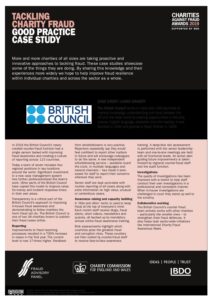Creating a counter-fraud function (British Council)
More and more charities of all sizes are taking proactive and innovative approaches to tackling fraud. These case studies showcase some of the things they are doing. By sharing this knowledge and their experiences more widely we hope to help improve fraud resilience within individual charities and across the sector as a whole.
 The British Council works in more than 100 countries to improve knowledge, understanding and trust between the UK and the wider world by creating opportunities in the arts, culture, English language, education and civil society. It was founded in 1934 and granted a Royal Charter in 1940.
The British Council works in more than 100 countries to improve knowledge, understanding and trust between the UK and the wider world by creating opportunities in the arts, culture, English language, education and civil society. It was founded in 1934 and granted a Royal Charter in 1940.
In 2016 the British Council’s newly-created counter-fraud function had a single person tasked with improving fraud awareness and creating a culture of reporting across 115 countries.
Today a team of seven includes four regional positions in key locations around the world. Significant investment in a new case management system has further professionalised the team’s work. Other parts of the British Council have copied this model to improve value-for-money and incident response times in their own areas.
Transparency is a critical part of the British Council’s approach to improving in-house fraud awareness and demonstrating to fellow charities the harm fraud can do. The British Council is one of two UK charities known to publish their fraud cases online.
Reporting
Improvements to fraud reporting processes resulted in a 700% increase in cases in the first year. The current level is now 17-times higher. Feedback from whistleblowers is very positive. Reporters repeatedly say they would feel confident to report other matters in future and will encourage colleagues to do the same. A new independent whistleblowing service – available round the clock, in multiple languages and several channels – has made it even easier for staff to report their concerns wherever they work.
Senior staff are kept up-to-date with routine reporting of all cases along with extra information on high value, unusual or contentious cases.
Awareness raising and capacity building
A ‘little and often’ tactic is used to keep fraud at the top of everyone’s mind. Each month staff receive blogs, fraud alerts, short videos, newsletters and quizzes, all backed up by mandatory annual online fraud awareness training. Risk assessments highlight which countries pose the greatest fraud and corruption risks. These counties are then visited by counter-fraud staff to receive face-to-face awareness training. A deep-dive risk assessment is performed with the senior leadership team and one-to-one meetings are held with all functional leads. An action plan guiding future improvements is taken forward by regional counter-fraud staff and the audit function.
Investigations
The quality of investigations has been improved with a toolkit to help staff conduct their own investigations in a professional and consistent manner. When in-house investigations are challenged in court they stand up well to the scrutiny.
Collaborative working
The British Council’s counter fraud team actively works with other charities – particularly the smaller ones – to strengthen their fraud defences. It also helps lead sector-wide initiatives like International Charity Fraud Awareness Week.
Download
Category Case studies
